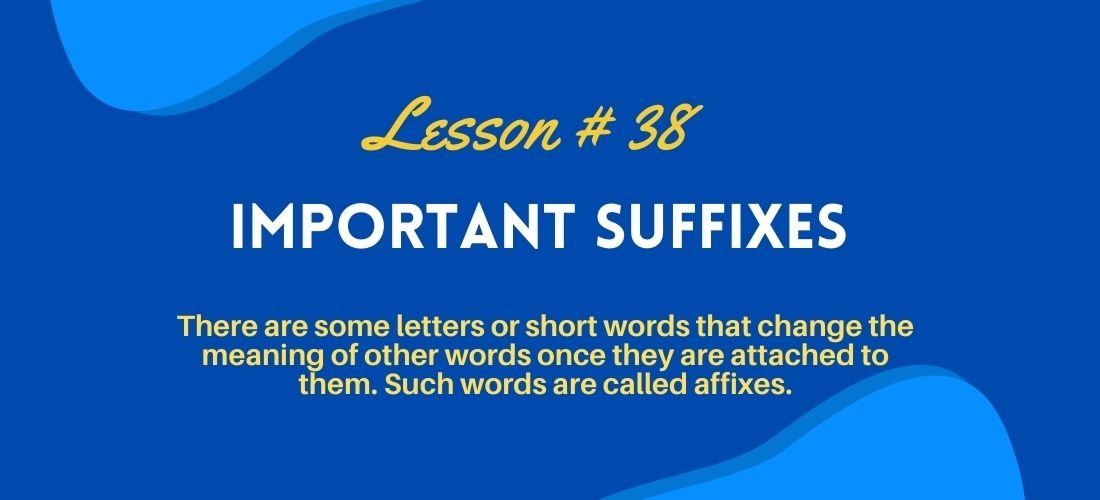Important Suffixes

Important Suffixes
There are some letters or short words that change the meaning of other words once they are attached to them. Such words are called affixes. There are three types of affixes.
- Prefix
- Infix
- Suffix
Prefixes are a combination of letters that are attached at the beginning of the word to form a new word. They change a verb to a noun or an adjective. For example (like-dislike, able-unable)
Infixes are not found in English, but they are found in other languages. Infixes are added in the middles of the word.
Suffixes are a combination of letters or mini words that are attached at the end of the word to form a new word. They change the grammatical function of the word.
In this lesson, we are going to learn the essential suffixes used in English.
Suffix meanings and spelling rules.
Most of the times, when we add a suffix to a word, it changes the meaning of the original word, then such a word is called a derivative word. To understand the meanings of the derivative words, it is of utmost preference to know the meaning of the suffix.
Also, remember that one suffix may have two meanings. For example, the suffix -er in adjectives gives the sense of 'more' ( longer, shorter, kinder, taller). But in nouns -er conveys the meaning ‘someone who performs a particular action’ such as worker, trainer, teacher, etc.
Most of the times, the spelling of the root verb is changed when a suffix is added to it.
- For example, if we add suffix with the words ending in -y ( beauty, ugly), the -y can change into -i ( beautiful, ugliness).
- If a word ends in -e ( adore, use ), and we add a suffix that begins with a vowel to such a word then the -e in them will drop ( usage, adorable).
- There is an exception that you cannot add any suffix to any word. Every word takes some specific suffix. For example, the adjective careful is formed by adding the suffix -'ful' to the noun care and the adjective ugliness is created by combining the suffix '-ness' to the adjective ugly.
Essential Suffixes in English.
There are many essential suffixes in English. Some of them are noun suffixes, some are adjective suffixes, and some of them are verb suffixes. The meaning of the words changes with the context. Always remember that to understand the meaning of a word, try to read the context in which it is used.
Common Noun suffixes
- -er/ -or / - ar
Meaning: One who performs some particular action
Example: teacher, director, tutor, lecturer, driver, advertiser, scholar, writer, worker, founder, barrister, janitor, doctor.
- -ion
Meaning: the process of
Example: motion, celebration, revision, differentiation
- -Age
Meaning: action, state or process
Example: baggage, orphanage, marriage, package, passage, luggage, footage, postage, storage, advantage, savage, damage.
- -ment
Meaning: the state or condition of.
Example: government, parliament, punishment, argument, endorsement, appointment, tournament, judgement.
- -al
Meaning: act or process of
Example: refusal, denial, proposal, arrival, approval, burial, deferral, removal, revival, ritual.
- -ent or -ant
meaning: people doing some activity
Example: student, assistant, respondent, participant, consultant, servant, applicant, superintendent.
- -ship
Meaning: position held
Example: fellowship, relationship, ownership, worship, hardship, chairmanship, partnership, township, friendship.
- -ty
Meaning: quality of
Example: cruelty, safety, plenty, capacity, charity, casualty, difficulty.
- -ness
Meaning: a state, quality, condition.
Example: happiness, sadness, readiness, rudeness, tiredness, heaviness, testiness, usefulness
- -ery/ -ry
Meaning: a business or trade, a condition, a behaviour
Example: bakery, slavery, robbery, bribery, misery, refinery, ministry, fishery, weaponry.
Common Adjective Suffixes
- -full
Meaning: full of
Example: beautiful, careful, awful, wonderful, awful, successful, skillful, grateful, fanciful, doubtful.
- -Less
Meaning: without
Example: powerless, useless, homeless, friendless, worthless, penniless, careless, thoughtless, endless.
- -able, -ible
Meaning: capable of being
Example: culpable, flammable, countable, uncountable, drinkable, eatable, avoidable, preventable, credible, adaptable, discernible.
- -ish
Meaning: nature or origin
Example: foolish, childish, Spanish, British, selfish, pinkish, blackish, polish.
- -ous
Meaning: quality or nature
Example: poisonous, mysterious, nervous, victorious, dangerous, famous, prosperous, continuous.
- -ant, -ent
Meaning: performing or being
Example: important, independent, different, dependent, excellent, brilliant, reliant.
- -ic
Meaning: relating to or having the nature of.
Example: iconic, poetic, heroic, organic, inorganic, photographic, basic, scientific, historic, athletic.
- -ly
Meaning: like
Example: friendly, daily, costly, monthly, cowardly, yearly.
- -ive
Meaning: having the nature of
Example: active, sensitive, cooperative, motive, supportive, decisive, divisive.
Common verb suffix
- -ate
Meaning: become
Example: repudiate, fabricate, differentiate, exterminate, captivate, annihilate.
- -ise (British), ize(American)
Meaning: to cause or to become.
Example: humanize, socialize, organize, advertise, legalize, authorize, commercialize, modernise, specialize.
- -fy or -ify
Meaning: make
Example: specify, classify, simplify, beautify, clarify, identify.
- -en
Meaning: become
Example: harden, soften, shorten, fasten, lengthen, strengthen.
Conclusion
Suffix offer us a variety of words. They act as an extension to vocabulary. Be careful with the suffix spelling rules because many people make mistakes while adding a suffix to the base verb. There are many more suffixes, but the common and important ones are mentioned in this lesson.
Exercise:
Choose the correct answer:
- The suffix of ‘enjoy’ is:
- Ful
- Able
- Ness
- -ed
- The suffix of ‘agree’ is
- Ness
- Able
- Ful
- Ly
- Zainab had no aware___ of the event.
- Ness
- Ment
- Ing
- -ed
- What is the root form of the adjective ‘creative’?
- Creativity
- Creative
- Create
- Create
- which of the following is the suffix of ‘imagine’?
- able
- -ed
- -ary
- -ly
Answer key:
- B
- B
- A
- D
- C


